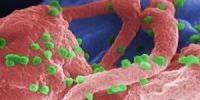Article
Eliminating Induction Dose and Shortening Interferon-free Combination Treatment Reduces Viral Load in Patients with Hepatitis C
Author(s):
Shortening IFN-free combination treatment of chronic HCV to 16 weeks and eliminating the induction dose of deleobuvir reduces viral load and treatment-induced side effects, according to a recent clinical trial.

Shortening interferon (IFN)-free combination treatment of chronic hepatitis C (HCV) to 16 weeks and eliminating the induction dose of deleobuvir reduced viral load and treatment-induced side effects, according to a recent clinical trial.
Parvez Mantry, MD, from The Liver Institute at Methodist Dallas Medical Center and colleagues reported their findings on October 4, 2013, at IDWeek 2013, a joint meeting of the Infectious Diseases Society of America (IDSA), the Society for Healthcare Epidemiology of America (SHEA), the HIV Medicine Association (HIVMA), and the Pediatric Infectious Diseases Society (PIDS), in San Francisco, CA.
IFN treatment is often used to treat HCV. However, the intravenous administration of this therapy and its associated side effects make this a less desirable treatment option for patients, according to Mantry. Direct-acting antiviral (DAA) drugs without IFN are currently being developed for HCV treatment and are often combined to target the enzyme production and replication of the virus more directly. Mantry said that the DAAs often have fewer side effects and are taken orally, which make them a favorable option for patients.
The authors previously studied a 28-week IFN-free treatment that combined faldoprevir, deleobuvir, and ribavirin (RBV) in a clinical trial. Approximately 85% of patients with the genotype (GT)-1a and 1b HCV subtypes had a sustained virologic response (SVR) after 12 weeks, meaning that the HCV virus was undetectable 12 weeks following treatment. However, pharmacokinetic and pharmacodynamic analysis revealed that the interaction between faldoprevir and deleobuvir increased blood plasma concentrations of both drugs. The initial loading dose of deleobuvir also increased the incidence of vomiting during the first eight days of treatment. In the present study, the authors eliminated this loading dose and decreased the treatment duration to 16 weeks to optimize the efficacy while minimizing the side effects.
Individuals with the HCV GT-1b subtype had the greatest success with this IFN-free faldoprevir/deleobuvir/RBV treatment. A total of 95% of these individuals achieved SVR after 12 weeks, including four patients with cirrhosis. Although 58% of patients with the GT-1a subtype had undetectable HCV levels at the end of treatment, only 12% had an SVR 12 weeks after treatment ended. The GT-1a subtype may be resistant to this particular treatment, according to Mantry. He said that future research is necessary to treat this subtype optimally.
The study also investigated adverse events associated with the treatment. The most frequently reported events were anemia, fatigue, vomiting, and nausea. Bilirubin levels increased to greater than 2.6 times the upper limit of normal (ULN) in 44% of patients, and hemoglobin decreased to less than 8.9 g/dL in 13% of patients. However, no patients experienced life-threatening side effects and of the 32 patients that participated in the study, three discontinued treatment because of adverse events. This suggests that this treatment was relatively well-tolerated, according to the researchers. However, the higher rate of relapse following this treatment in the GT-1a subtype should be investigated in future studies.
All authors listed financial disclosures.
2 Commerce Drive
Cranbury, NJ 08512
All rights reserved.





